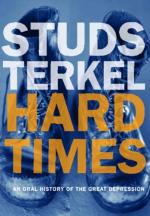
|
| Name: _________________________ | Period: ___________________ |
This test consists of 15 multiple choice questions and 5 short answer questions.
Multiple Choice Questions
1. What was Huey Long's central message in his nationally broadcast speeches?
(a) Establishing a national bank.
(b) Entering World War II.
(c) Redistibution of wealth.
(d) Segregation.
2. At the beginning of The Fine and Lively Arts, Hiram Sherman speaks glowingly of drinking covert gin out of what?
(a) Flasks.
(b) Teacups.
(c) Bowls.
(d) Soda bottles.
3. What does Wilbur Kane still dislike about Roosevelt?
(a) He stayed in office past two full terms.
(b) He waited too long to take on Hitler.
(c) He did away with the NRA.
(d) He tried to pack the Supreme Court.
4. What was Dorothea Lange's profession?
(a) Nurse.
(b) Photographer.
(c) Economist.
(d) Newspaper columnist.
5. What does Edward Burgess say he never saw in Chicago in the 1930's?
(a) Bread lines.
(b) Apple carts.
(c) Speakeasy raids.
(d) Union strikes.
6. What was Paul Draper's occupation during the 1930's?
(a) Playwright.
(b) Actor.
(c) Dancer.
(d) Photographer.
7. According to Max Shachtman, why was Communism especially vital just before FDR was elected?
(a) World War I destabilized many western democracies.
(b) The US seemed set to ally with the USSR.
(c) Capitalism seemed doomed.
(d) Hoover's administration was riddled with communists.
8. What event discussed earlier in the book does Harry Norgard think was destructive to society?
(a) The Bank Holiday.
(b) The Detroit sit-in.
(c) The Cradle Will Rock premiere.
(d) The Chicago teachers' strike.
9. Aaron Barkham informs the reader of what strange practice of certain clans within the Appalachian Ku Klux Klan?
(a) They had black members.
(b) They spoke Gaelic to each other.
(c) They had bake sales.
(d) They were entirely composed of women.
10. What issue does Stanley Kell surprisingly support?
(a) Legalizing marijuana.
(b) Integration.
(c) George McGovern's campaign.
(d) Leaving Vietnam.
11. According to Buddy Blankenship in Sixteen Ton, what was the state of coal miners before the Depression?
(a) Absurdly prosperous.
(b) A normal middle-class community.
(c) The same as during the Depression.
(d) Moderately well-to-do.
12. Why did C. Wright Patman push for the impeachment of Hoover's Treasury Secretary?
(a) He promoted market speculation.
(b) He stopped the World War I bonuses.
(c) He was not an American citizen.
(d) He failed to address the stock market crash.
13. Who played the piano for opening night of The Cradle Will Rock?
(a) George Gershwin.
(b) John Houseman.
(c) Hiram Sherman.
(d) Marc Blitzstein.
14. According to Scoop Lankford, when did conditions finally improve in the prison?
(a) When Truman took office.
(b) When the rioting started.
(c) When the war started.
(d) When the WPA started.
15. As he entered his later years, what term did Roosevelt use to describe himself among aides?
(a) The poor public servant.
(b) Ozymandias.
(c) The indispensible man.
(d) King Frank.
Short Answer Questions
1. How did some states begin paying public school teachers in the 1930's?
2. What change to the ticket structure did the Schaffner Players make after the 1929 Crash?
3. According to Gardiner Means, what ended with the Depression?
4. What was the Actors Union's response to The Cradle Will Rock?
5. What shocking information did General Smedley Butler report to Congress in the 1930's?
|
This section contains 556 words (approx. 2 pages at 300 words per page) |

|




